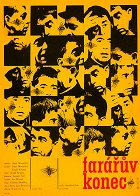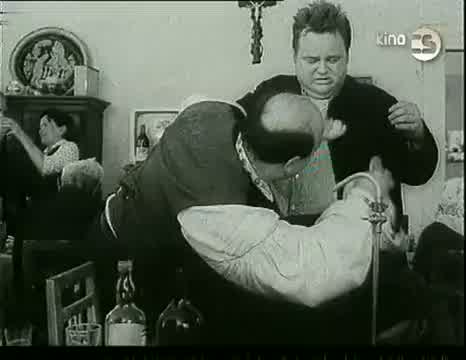Regie:
Evald SchormKamera:
Jaromír ŠofrMusik:
Jan KlusákBesetzung:
Vlastimil Brodský, Jan Libíček, Jana Brechova, Zdena Salivarová-Škvorecká, Jaroslav Satoranský, Vladimír Valenta, Helena Růžičková (mehr)Inhalte(1)
A charming story of a church caretaker to whom fate provides the opportunity to pose as a vicar in an obscure mountain village. With personable and rare sympathy for human weakness, he fulfills his role to the general satisfaction of a village longing for spiritual comfort. It's as if this false priest has breathed new life into the villagers and thus changes the absurd image of this idyllic village. In a hectic conclusion full of intrigue and plot twists, he gives into the temptation that has surrounded him. The film deals with tolerance as one of the basic conditions necessary for one's full and undistorted personal fulfillment and for human happiness in this world, as well as belief in honesty, decency, fairness and love as values that are the foundation for everything that makes sense. (Zlín Film Festival)
(mehr)Kritiken (3)
Solch eine niedliche gruselige Story mit einer etwas stumpfgewordenen satirischen Klinge und einer nicht ganz konsistenten Metapher. Manchmal macht es viel Spaß, jedoch das parallele Porträt der Götzendienstes und "Parteilichkeit" verläuft irgendwie im Sand und am Ende bleibt nur eine sehr zugeneigte dörfliche Atmosphäre und eine wirklich exzellente Sechziger-Jahre-Gruppe an Schauspielern. Ansonsten ist es im Vergleich zu den zeitgenössischen Top-Leistungen wirklich zahm und konfliktfrei.
()
I had considered The End of a Priest one of the most impressive films of Czechoslovak cinema of the 1960s. However, repeated viewing years later did not confirm my exceptional experience. From Schorm's film emerged only a solid, mediocre piece, which elevates the presence of two great actors - Vlastimil Brodský and Jan Libíček. Libíček excels in the role of a rural teacher and mayor. It is one of the most rewarding characters of his prematurely ended yet intense and successful acting career. His character of careerist, manipulator, and intriguer represents the face of state power, which the actor systematically parodies, ironizes, and mocks ideological clichés, phrases, and hypocrisy. His counterpart represents a sympathetic church custodian who, rather out of misunderstanding than ill intent, accepts the position of a priest in a village he passes through. The new role, secretly desiring it, gradually engulfs him, and the fake priest becomes a moral authority and counterbalance to secular power. This starting point is very interesting, but due to the potential remaining untapped, it falls short of what it deserves. The film is highly inconsistent - on the one hand, it aims for a relaxed comedy from the Czech countryside in a more refined style, characterized by characters like a stubborn hypochondriac grandmother. On the other hand, allegorical motifs appear in scenes with a traveling theater and strange supervisors-advisors, which would be more suited for intellectual reflection for a demanding viewer. Add to that the tragic ending, which clashes with the pleasant comedic atmosphere, and the result is a film that doesn't know what it wants to be. Overall impression: 65%.
()
Vlastimil Brodský und Jan Libíček glänzen in einem zynischen Gleichnis, das sich in einer unbestimmten Zeit und an einem unbestimmten Ort abspielt. Es hat aber einen ganz klaren Gedanken. Wer ist falsch und wer echt? Wer täuscht was vor und warum? Wem kann man glauben und vor wem sollte man sich lieber in Acht nehmen? Vor 47 Jahren konnte man es genauso schwer wie heute erkennen. Der Mensch ist im Grunde genommen böse…
()

